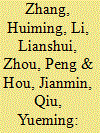| Srl | Item |
| 1 |
ID:
187857


|
|
|
|
|
| Summary/Abstract |
Programs to alleviate poverty by corporations are increasingly popular as a new form of corporate social responsibility. This study examines how the political connections of a firm's chairperson are associated with decisions to alleviate poverty based on a sample of listed Chinese firms from 2016 to 2018. We find that the chairperson's political connections increase the probability of participation and the amount of investment in programs to alleviate poverty. This positive relationship is mainly manifested in firms with high agency costs and low regional economic conditions. In addition, the chairperson's political connections are not related to the efficiency of the poverty alleviation program. Politically connected firms receive less government recognition with an increase in investment in poverty alleviation. Our findings are consistent with the notion that firms participate in poverty alleviation programs for reciprocal favor exchanges, but they fail to manage these programs efficiently.
|
|
|
|
|
|
|
|
|
|
|
|
|
|
|
|
| 2 |
ID:
127227


|
|
|
|
|
| Publication |
2014.
|
| Summary/Abstract |
Many countries are concerned with the waste-to-energy for economic development and societal welfare. This paper constructs a dynamic game model that, for the first time compares the incentive effects of four common subsidy modes on waste cooking oil supply for biofuel refining and sales of waste cooking oil refined products. The model considers the impact of preferential tax treatment, a raw material subsidy, a sales subsidy and an investment subsidy on the profits of biofuel enterprises and waste cooking oil recyclers. Results indicate that common approaches adopted in developed economies such as raw material price subsidies and finished products sales subsidies increase the profits of both biofuel enterprises and recyclers. On the contrary, investment subsidies, which are relatively common in some regions of China, increase the profits of recyclers, while reducing revenues achieved by biofuel enterprises. To promote the supply chain, policy should give priority to raw material price subsidies and finished products sales subsidies, and for investment subsidies, however, the government should be cautious.
|
|
|
|
|
|
|
|
|
|
|
|
|
|
|
|